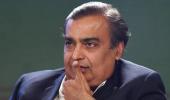The Reserve Bank of India on Wednesday retained the economic growth projection for the current financial year at 10.5 per cent, while cautioning that the recent surge in COVID-19 infections has created uncertainty over the economic growth recovery.

In its last policy review, the RBI had projected a GDP growth rate of 10.5 pc for FY'22.
Taking various factors into consideration, it said, "the projection of real GDP growth for 2021-22 is retained at 10.5 per cent consisting of 26.2 per cent in Q1, 8.3 per cent in Q2, 5.4 per cent in Q3 and 6.2 per cent in Q4."
In a statement after the first Monetary Policy Committee (MPC), RBI Governor Shaktikanta Das said the recent surge in COVID-19 infections adds uncertainty to the domestic growth outlook amidst tightening of restrictions by some state governments.
The RBI said that though the firms engaged in manufacturing, services and infrastructure sectors were optimistic about a pick-up in demand, "consumer confidence, on the other hand, has dipped with the recent surge in COVID infections in some states imparting uncertainty to the outlook."
Das noted the recent surge in infections has imparted greater uncertainty to the outlook and needs to be closely watched, especially as localised and regional lockdowns could dampen the recent improvement in demand conditions and delay the return of normalcy.
Das said that the increase in international commodity prices since the February monetary policy and recurrence of global financial market volatility like the bout experienced in late February accentuates the downside risks.
He noted that global growth is gradually recovering from the slowdown, but it remains uneven across countries and is supported by ongoing vaccination drives, sustained accommodative monetary policies and further sizable fiscal stimulus.
The upside risks, however, come from the vaccination programme being speeded up and increasingly extended to the wider segments of the population; the gradual release of pent-up demand; and the investment-enhancing and growth-supportive reform measures taken by the government, he said.
"In India, we are now better prepared to meet the challenges posed by this resurgence in infections.
“Fiscal and monetary authorities stand ready to act in a coordinated manner to limit its spillovers to the economy at large and contain its fallout on the ongoing recovery," he said.
He further noted that "in the domestic economy, the focus must now be on containing the spread of the virus as well as on economic revival - consolidating the gains achieved so far and sustaining the impulses of growth in the new financial year (2021-22)".
Das stressed that the focus of the Union Budget 2021-22, on investment-led measures with increased allocations for capital expenditure, the expanded production-linked incentives (PLI) scheme, and rising capacity utilisation will reinforce the process of economic revival.
"Juxtaposition of high frequency lead and coincident indicators reveals that economic activity is normalising in spite of the surge in infections," he said, and added rural demand remains buoyant and record agriculture production in 2020-21 bodes well for its resilience.
Urban demand has gained traction and should get a fillip with the ongoing vaccination drive.
The National Statistical Office (NSO) in its update on February 26, 2021 placed the contraction in real GDP at 8.0 per cent for 2020-21.
The IMF on Tuesday projected an impressive 12.5 per cent growth rate for India in 2021, stronger than that of China, the only major economy to have a positive growth rate last year during the COVID-19 pandemic.
The Washington-based global financial institution, in its annual World Economic Outlook ahead of the annual Spring meeting with the World Bank, said the Indian economy is expected to grow by 6.9 per cent in 2022.
Photograph: Francis Mascarenhas/Reuters











 © 2025
© 2025